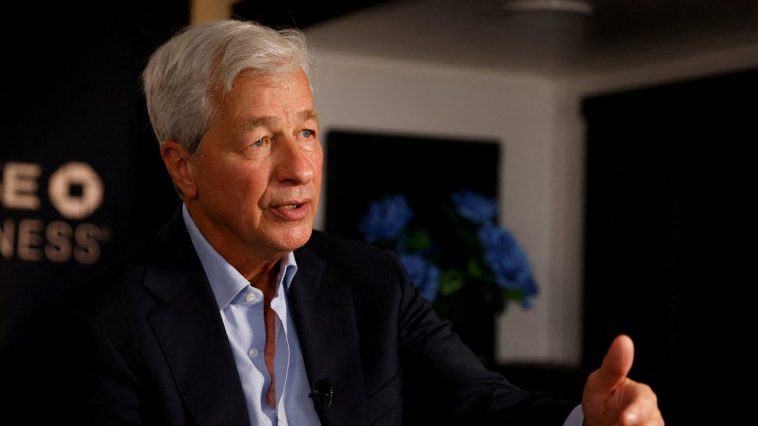LISTEN HERE:
In his annual letter to shareholders, JP Morgan CEO Jaime Dimon made a contentious statement, asserting that the government should seize private property to build wind and solar farms. He also suggested that green initiatives should be embraced to eventually meet net-zero targets. While these goals are admirable, there are several reasons to disagree with Dimon’s perspective on this issue.
Well, now we know the JP Morgan CEO is against Freedom, America, and is an Enemy of the people. https://t.co/phCrGx1qbC
— Drew (@BlueyzDrew) April 5, 2023
Dimon’s call for government seizure of private property, though well-intentioned, raises serious concerns about property rights and the potential for government overreach. Instead of resorting to such drastic measures, more emphasis should be placed on the exploration of alternative solutions, such as incentivizing private landowners to lease their property for renewable energy projects.
JUST IN: JPMorgan $JPM CEO says governments should seize private property to build wind and solar farms.
— Crypto News Updates (@CryptoNewsUpd8s) April 5, 2023
While Dimon’s letter also touched upon his views on the banking crisis and its potential implications on the economy, his focus on seizing private property for green projects is particularly troubling. It is worth considering whether this approach might have unintended negative consequences for property owners and the broader economy.
"In what is a rather surprising statement, Jaime Dimon has spoken on the lengths he is willing to go to for green projects"
Correction, the lengths he is willing others to let go to.— Ben (@Ben02076331) April 5, 2023
In his annual letter, Dimon argued that permitting reforms are desperately needed to expedite investments in renewable energy projects. Although regulatory changes are certainly important, proposing to use eminent domain as a solution may be an overreach. Eminent domain refers to the compulsory acquisition of private property by a government or state for public use, often raising ethical and legal concerns.
So Jaime Dimon is in favor of Marx style takeovers of private property now? $JPM pic.twitter.com/aWXbd1AG8b
— North Lake Capital (@lg_andrew) April 5, 2023
Instead of calling for governments to prioritize climate concerns over private land and property ownership, a more balanced approach could involve fostering public-private partnerships, offering financial incentives, and streamlining the permitting process to encourage renewable energy development on private land.
Dimon’s emphasis on the dire state of the energy crisis is valid, as there is an urgent need to provide affordable and reliable energy for today and invest in de-carbonization for tomorrow. However, suggesting that governments should seize private property to achieve these goals may not be the most equitable or effective approach to addressing the issue.
They can start by seizing the @JPMorgan CEO's private property. I'm sure Jaime Dimon wouldn't mind if the government seized his property for green projects.
— ???? EerieFun ?? – ????? (@EerieFun) April 5, 2023
In conclusion, while it is commendable that Jaime Dimon is advocating for green initiatives and the fight against climate change, his suggestion to use eminent domain as a solution raises concerns about property rights and the potential for unintended consequences.
A more balanced and collaborative approach, focusing on incentives and partnerships, could be a more effective way to accelerate the transition to renewable energy sources while respecting the rights of property owners.
Jaime Dimon was Epstein's best bro.@jpmorgan needs to fire him and the rest of its executive pedophiles.
These are the clowns who will save the banking sector?@CNBC @business— Johnathon Rambo? (@DeepAtem) April 4, 2023
@bsurveillance By economic & national security interest, Jaime Dimon @jpmorgan must mean his own & @jpmorgan shareholders’ economic & security interest. Throughout history, individuals & groups have equated their interests to be the nation’s interest to their exclusive benefit.
— Victor Ibabao, MPH (@VictorIbabao) April 4, 2023



